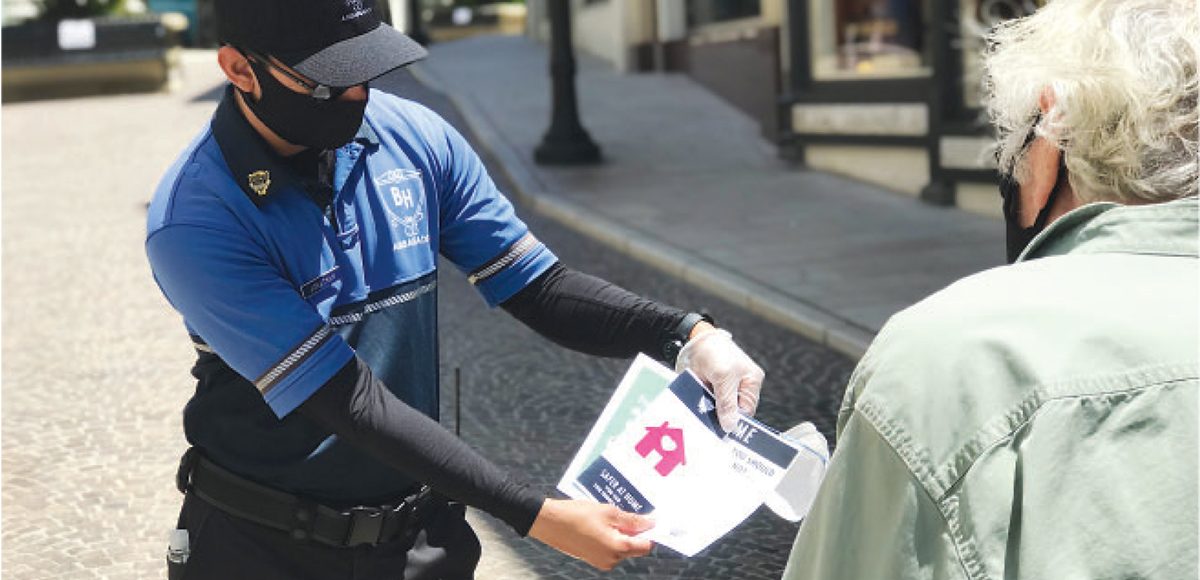For Beverly Hills Ambassador Jonathan Leon, his job has been anything but “business as usual” since the COVID-19 outbreak forced most people inside their homes. These days, educating people about the need to appropriately social distance or wear a face covering (a Beverly Hills law), has wholly usurped tourist-centric conversations where he was able to leverage his naturally affable personality to make visitors feel welcome.
In fact, one of the most recognizable features of all 18 Ambassadors their smiles now remain hidden beneath masks needed to help prevent the spread of COVID-19.
“Since the pandemic happening it’s been a drastic change,” Leon recently told the Courier. “We’re always keeping in mind to keep our distance. Just protect the community, and ourselves and them.”
From educating those who are unaware of Beverly Hills Ordinance No. 20-0-2806, which mandates that people must wear face coverings when they have the potential of coming within six feet of someone else, to advising people to appropriately social distance, ambassadors made a total of 422 “social education” contacts in April according to Kris Zagyva, operations manager with the Ambassadors program. The biggest concentrations, he said, were happening in the City’s parks, along South Beverly, and on Rodeo Drive.
“For the most part, we’re seeing a lot of people with masks and people are social distancing as best they can,” Human Services Administrator James Latta told the Courier. In addition to educating people about the City’s face covering mandate, Ambassadors will also provide people with surgical comfort masks. “We’re doing our best not to give citations. Everyone’s trying to adjust to this difficult time.”
While Ambassadors are not empowered to issue citations for face mask violations, which carry an initial fine of $100 for the first offense, they have the support of the Beverly Hills Police. According to Lt. Elizabeth Albanese, no citations have yet been issued.
On May 7, the Human Relations Commission recommended that the Ambassadors receive a raise. Ambassadors currently earn from $15.50 to $16.50 an hour, depending on how long they’ve been with the City. The Commission recommended an increase to $18, which will need to go before the City Council for deliberation. According to Zagyva, the program’s biggest challenge is retention, with many Ambassadors lured away to work for local businesses as security guards for significantly higher pay.
“It is imperative that the City support the Ambassadors and recognize their tremendous efforts on behalf of our City,” Human Relations Commission Chair Ori Blumenfeld told the Courier. “We whole-heartedly recommend the City Council approve the increase to retain our beloved Ambassadors, whom provide necessary and essential services to our community as a whole.”
In light of the dramatically diminished number of people on the streets, in place of dealing with a preponderance hospitality-related tasks, including interacting with tourists, Zagyva said the Ambassadors have been able to serve the City in other enhanced ways. They now more actively patrol the entryways of stores, in addition to being able to patrol the City’s parking lots 24/7, as opposed to just checking the structures in the evening. Latta said the City has about 1.8 million square feet of parking structures and the increased patrols help to curb camping, graffiti, vandalism, and even defecation. There’s also been a decrease in aggressive panhandling in the City, but an increase in the number of transients now coming into the City, which the Ambassadors deal with.
“The best way to describe it is ‘rolling with the punches.’ The requirements are ever changing,” Zagyva said.
The behind-the-scenes work has also changed for Ambassadors who must now have office briefings outdoors spaced eight- feet apart, in addition to limited access to the locker rooms so that not more than one person is inside. Latta said the Ambassadors are also being checked for symptoms of COVID-19, including having their temperatures taken at the beginning and end of each shift.
“It’s really a change how we do things,” Latta said.
To date, no Ambassador has tested positive for COVID-19, he said.







